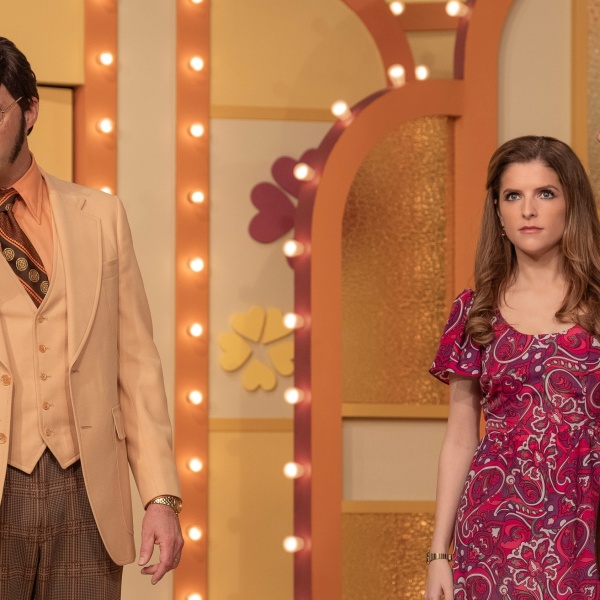Imagine you’ve just begun your life as an immigrant in wintry Winnipeg, when suddenly you’re catfished by your own overbearing mother. She, who’s been running a guest house back home in Korea since your father passed, and leaves you an inordinate number of voicemails trying to match you with any handsome visiting Canadians. She, who while you are in a coma, accidentally shuts out your street cat friend, accidentally chugs your weed gummies, “accidentally” knocks out your lovely colleague with a broomstick, and far from accidentally fills your bathtub with the succulent ingredients of kimchi (after emptying giant jars of pickle into the supermarket trash can).
26-year-old Sumi (Leere Park) can’t really anticipate these turns of events that constitute the first act of Chinese Canadian writer-director Johnny Ma’s surprisingly funny and emotionally honest dramedy, “The Mother and the Bear” (executive produced by Pablo Larraín). For nearly the entirety of the movie, which unfolds over a couple weeks in the lead up to Lunar New Year, Sumi remains in a medically induced coma, a mere precaution after a nasty slip on the ice while encountering a suspiciously ursine creature in a dark downtown alley.
With her out of the picture, we watch — with an amusement that gradually becomes less guarded — the snowy adventures and hardships of her visiting mother Sara (played with endearing curiosity and admirable range by Kim Ho-jung) as she discovers online dating, creates a fake persona for her daughter, and ends up flirting with her own romance in a kimchi-mediated meet cute with Sam washed up restaurant owner (a graceful Won-jae Lee) who’s also estranged from his “golden boy” adult son.
Ma directs Kim with remarkable clarity in his third feature, a stylistic and thematic departure from his previous work, which includes 2016’s psychological thriller “Old Stone” and the more recent “To Live To Sing,” an ode to a Sichuan Opera troupe. However, as we closely watch Kim stake out the perfect match for Sumi, dance stoned to “Unchained Melody” right before she receives a “DTF?” dick pic, and help guide Sam into coming to terms with his reality as a divorcé, we get the sense that the actor proactively and effortlessly brings her brand of elan to Ma’s characterization. Her interpretation has a certain vigor and charge, similar to Shinobu Terajima’s evocation of her titular character in Atsuko Hirayanagi’s massively underrated “Oh Lucy!”
Kim scrapes off the icy veneer of persistent, problematic Asian mother stereotypes, not simply by demonstrating her genuine befuddlement regarding her daughter’s choice to live in a far-off country (or worse, why there’s no food in her fridge!), but also in the ways she infuses the online alter-ego she creates with a revealing degree of emotional intelligence. She deflects when she admits to Sam that Sumi never returns her calls, and later, after a cackle-inducing plot twist, wonders aloud to him: “Are you sure we’re good parents?”
The answer to that question is complicated, but Kim does well to let Sara’s persistence run its course; past the early awkward insistence of making a show of who gets to pay, and toward building her natural appetite for recognizing others’ sadness. That starts when Sara realizes that her daughter’s colleague is a closer relationship than she had initially supposed. As audiences, we feel Ma cherish the natural empathy of his lead actor. By doing so, Sara becomes as nuanced as other similar Korean mother figures, such as Choi Seung-yoon’s single mom in Anthony Shim’s exquisite intercontinental drama “Riceboy Sleeps,” or even Yuh-jung Youn’s “playful and vulgar” grandma in Lee Isaac Chung’s “Minari.”
This is not to take away from Ma’s own directorial flourishes, or his penchant for a comedic mix of awkwardness and whimsy, as observed in a delightful karaoke scene injected with Winnipeg sports imagery that doubles as a welcome tonal departure. Also notable is the cozy-as-a-shawl soundtrack, which brims with beckoning mid-century ballads (both American and Korean) and is textured mixed with all sorts of whoops, plops, and playful echoes to complement Sara’s cheesy ploy making.
Any weaknesses lie more in the slightly tired general themes Ma explores. “The Mother and the Bear” doesn’t bring a lot of new material to the familiar narrative of parents becoming enlightened towards their child’s sexuality. Even the story engine about the discovery of online dating and the chain of cutesy indiscretions that follows doesn’t feel particularly novel. After all, Canada has already given global audiences a series worth of laughs at the expense of ajummas, in “Kim’s Convenience. Though perhaps that’s an unfair comparison; maybe it’s because we’ve chuckled alongside that CBC sitcom, or absorbed the pathos of intergenerational Asian journeys (towards the old country) in films like “Return to Seoul” and “The Farewell,” that we’re able to better appreciate the subtle intermingling of comedy and drama that Ma and Kim bring about in “The Mother and the Bear”.
And what of the eponymous bear? Is it real, an urban legend, a shapeshifter, a genre accretion, a character’s hallucination, a low key VFX sibling of the alien dogs in “Attack the Block”, or an allegory for the cosmic diasporic immigrant condition? All that is apt to say is that Ma isn’t precious about when and how he channels the bear. He retains focus on and stomps well alongside the mother’s journey, from dependence to interdependence to independence. That’s what really counts.
Grade B
“The Mother and the Bear” premiered at the 2024 Toronto International Film Festival. It is currently seeking U.S. distribution.
Want to stay up to date on IndieWire’s film reviews and critical thoughts? Subscribe here to our newly launched newsletter, In Review by David Ehrlich, in which our Chief Film Critic and Head Reviews Editor rounds up the best reviews, streaming picks, and offers some new musings, all only available to subscribers.






